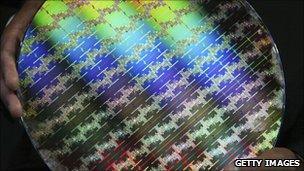Oracle faces HP in court over Itanium chip lawsuit
- Published

Oracle violated its contract with Hewlett-Packard (HP) after it decided that future versions of its database software would not support a line of HP servers, HP's lawyer has said in court.
The trial in San Jose, California, centres on a lawsuit that HP filed against Oracle last year.
The dispute concerns Oracle's decision to end support for Intel's Itanium chip that the firm says is being phased out.
HP is seeking up to $4bn (£2.6bn) in damages.
The trial comes days after the software developer lost its case against Google over Oracle's Java programming language.
When HP, the world's largest PC maker, filed the lawsuit in June last year, it said Oracle's decision would hurt its clients.
It said there was mutual agreement between the firms that the support for Itanium, a component of high-end HP servers, would continue.
In 2011, Oracle decided to stop developing versions of its database software supporting HP servers that use Itanium.
It asserted that the chip's manufacturer, Intel, was going to phase out the product - something Intel has denied.
Intel's chief executive, Paul Otellini, is expected to testify at the trial, although the company is not a party in the lawsuit.
Besides damages, HP is now seeking a court order that would require Oracle to continue developing software for its servers.
'Like a divorce'
The relationship between HP and Oracle has deteriorated in the past year.
After HP's former chief executive Mark Hurd became Oracle's co-president in 2010, HP threatened court action.
It claimed that Oracle would "exploit the knowledge of HP's strengths and weaknesses" as a result of hiring Mr Hurd.
However, the matter was subsequently settled.
HP lawyer Jeffrey Thomas argued on Monday that the settlement was a clear sign of Oracle's commitment to continue supporting Itanium, binding the firm to continue offering its "best products" to HP.
"It is impossible to offer best products going forward without porting new versions of those products," Mr Thomas said.
The firm has insisted in court filings that Oracle breached its obligation, outlined in the settlement over Mr Hurd's job switch, "to continue to offer its product suite on Hewlett-Packard's server platforms".
But Oracle attorney Dan Wall disagreed, stressing that Itanium was a declining product.
"HP is trying to force Oracle to support a technology, Itanium, that Oracle does not believe in," Mr Wall said.
It is now up to the judge to decide whether there is a contract between the two technology giants, and if so, on what terms.
If the judge rules in HP's favour, a jury will decide whether Oracle violated the contract and will consider damages.
Earlier, the judge compared the dispute to a divorce, saying that "this case appears to be the end of a marriage" between the two firms.
- Published22 April 2011
- Published1 June 2012
- Published16 June 2011
- Published20 September 2010
- Published19 April 2011